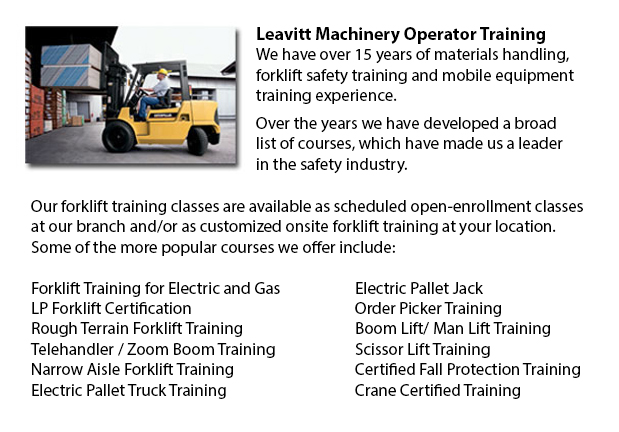
Kingston Forklift Certification Schools - In North America, forklift certification is mandatory, making forklift training programs necessary for both the company and their workers working as forklift operators. Forklift training focuses on health and safety issues included in forklift operation. Safety concerns affect both the forklift driver and personnel and other individuals who are in the vicinity of the forklift. Businesses might be subject to penalties if they are caught with un-certified operators during a check up. There are many compelling reasons why businesses must abide by forklift standards.
Before the worker or trainee is certified to drive a forklift, most state, provincial and federal regulations would need the employee undergo an evaluation of the skills necessary for forklift safety. There are several forklift certification schools offering courses for employees and there are likewise schools that provide on-line forklift training. However, employers should know that forklift certification training is not "just a test". Right forklift training should contain some areas of study, such as theory and hands-on practice. Rules do not need employers to have an outside organization to certify operators of forklifts.
A quality forklift certification school will include a suggested curriculum that comprises classroom training and hands-on training that is performed on-site. The training sessions in the classroom include power point presentations, videos, discussions and models. Students typically must write a test to check for subject matter comprehension. Certificates of completion are issued upon successful completion of the class.
The use of the equipment evaluation needs the trainee to understand the job site hazards, pre-operational machine check, a pass/fail operational test and operational instruction.
Training usually covers the following subject areas: Controls & Instrumentations; Understanding regulations and legislations; Steering and Maneuvering; Engine Operation and Maintenance; Fork and Attachment Restrictions, Visibility; Stability, Rated Capacities, Inspection & Maintenance; Refueling; Load Manipulation; Pedestrians, and Hazardous Places & Rough Terrain Operation. Furthermore, there are training courses offered for employees who are transitioning to new job positions.
-
Narrow Aisle Forklift / Order Picker Training / Electric Pallet Jack / Electric Pallet Truck Training in Kingston
A pallet lift is a piece of equipment dedicated in the moving of pallets of various dimensions and weights. They might be utilized as an accessory for forklifts, cranes and other styles of heavy machinery or be applied on their own. Pallet lifts are... More -
Kingston Forklift Training School
Kingston Forklift Training School - Forklift Training School - Industry and federal regulators have established the criteria for forklift safety training based on their existing regulations and standards. People wishing to operate a forklift must fin... More -
Kingston Scissor Lift Certification
Kingston Scissor Lift Certification - Scissor lift platforms are utilized at work locations to enable tradespeople - such as iron workers, welders and masons - to reach their work. Making use of a scissor lift platform is usually secondary to their t... More -
Kingston Boom Lift Safety Training
Kingston Boom Lift Safey Training - Boom lifts are a type of elevated work platform or aerial lifting device that are normally utilized in warehousing, construction and industry. Boom lifts could be made use of in practically whichever environment du... More -
Kingston Fall Protection Ticket
Kingston Fall Protection Ticket - Fall-related incidents are the number one reason of death in the construction business. The possibility for fall accidents very much increases based upon the type of work which is being accomplished within your workp... More -
Telehandler Training in Kingston
Telescopic handlers normally called telehandlers for short, are an extremely popular piece of heavy construction machinery. They are widely utilized in the construction and agricultural trades. These machines have farthest reaching ability and are ab... More -
Kingston Warehouse Forklift Training Programs
Kingston Warehouse Forklift Training Programs - Warehouses could either be retail, industrial or commercial facilities, functioning from bulk product retailing to product distribution services. Regardless of the type of warehouse, personnel inside wa... More -
Kingston Heavy Equipment Ticket
Kingston Heavy Equipment Ticket - Depending on the nature of the job at hand, the kind of construction machinery that a heavy equipment operator utilizes varies. Every type of equipment is built to do particular jobs in the most effective method comm... More

Forklift Certification Kingston
TOLL FREE: 1-888-254-6157
Kingston, Ontario
forkliftcertificationkingston.com
Email Us
About Us


